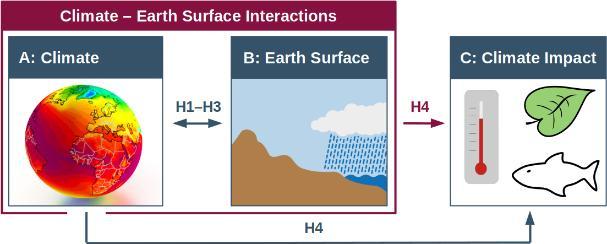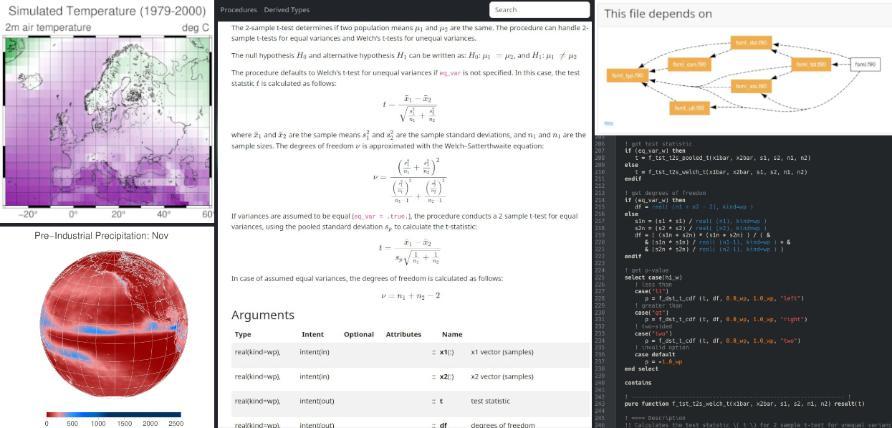Dr Rer Nat Habil Sebastian Mutz
- Senior Lecturer in Paleoclimate Modelling (School of Geographical & Earth Sciences)
Biography
Short Introduction
I'm a computational climatologist and investigate climate system dynamics and the impacts of climate change on the regional climate/weather (incl. extremes) and the Earth's surface (e.g., glaciers and erosion). I apply theoretical-numerical and empirical models (based on statistics and machine learning) to understand and predict processes and events in the climate system. I currently serve as manager of ExaGEO (exascale computing for environmental solutions), on the steering committee of the ESM-AI (Earth System Modelling and Artificial Intelligence) forum of SAGES (Scottish Alliance for Geoscience, Environment and Society) and on the EGU-OC (European Geosciences Union Outreach Committee), and as topical editor for the journals Earth System Dynamics and Geoscience Communication. Recent outreach efforts include the development of open and accessible educational materials about climate science and Earthquakes. I am an advocate of „open science“, multilateral collaboration, and ethical and sustainable (open-source) software development.
Education and Career
- 2023 — now
Senior Lecturer / Associate Professor at the University of Glasgow, UK - 2016 — 2023
Lecturer / Assistant Professor at the University of Tübingen, Germany
Habilitation (Dr. habil.) attesting research and teaching excellence
Evaluation: C. Zarfl, S. Hergarten, professorial committee - 2012 — 2016
Postdoctoral Researcher at the University of Tübingen, Germany - 2008 — 2012
Doctoral Researcher at the University of Würzburg, Germany
Doctorate (Dr. rer. nat.) in Physical Geography and Climatology
Supervision: H. Paeth, S. Winkler - 2004 — 2008
Integrated masters student at the University of Leicester, UK
Master (MGeol) in Geology with Palaeobiology
Supervision: S. Davies, M. Purnell - 2004
Graduated from the British International School Kyiv
Research interests
Research Topics
My research focuses on the interactions between climate and the other Earth system components. The core topics of this research can be organised into three well-connected categories: A) Climate (past, present, future), B) Earth surface dynamics, and C) contemporary climate change impact assessments and predictions (Fig. R1).

These research topics are linked by several broad hypotheses, which can be summarised as follows:
- H1: Climate change exerts significant and measurable control on Earth surface systems and processes.
- H2: Synoptic-scale climate variability can explain much of the variation in terrestrial hydrology, regional near-surface climate and extremes.
- H3: Changes in Earth surface properties result in significant and measurable impacts on regional and global climate.
- H4: Earth has already experienced climates similar to potential future climates caused by anthropogenic factors.
Development
I develop research tools, numerical models, and teaching materials in modern Fortran and Python. Sustainability, accessibility, and ethics are key considerations. Consequently, all developed code and resources are open-access and open-source, and Fortran is used when reliability, performance, and energy efficiency are important. See some of the projects on GitHub.

Grants
- 2024 — 2025: ~£31,270, Natural Environment Research Council (NERC).
Topic: Glacial Ecology Changes in the 21st Century (GECO-21).
Investigator(s): Cameron, Mutz - 2020 — 2024: €210,520, German Research Foundation (DFG).
Topic: Reconstructing Eastward Propagation of Surface Uplift in the Alps: Integrating Stable Isotope Palaeoaltimetry and Palaeoclimate Modelling.
Investigator(s): Mutz, Ehlers (separate project by Meijers, Methner, Mulch) - 2020 — 2021: €750, European Geosciences Union (EGU).
Topic: INTEGRATE: open-access, open-source teaching package for climate and machine learning.
Investigator(s): Mutz - 2017 — 2022: €188,212, German Research Foundation (DFG).
Topic: Neogene paleoelevation and paleoclimate of the central Alps - Linking surface processes to lithospheric dynamics.
Investigator(s): Ehlers, Mutz (separate project by Mulch, Methner) - 2017 — 2022: €122,625, Federal Ministry for Education and Research (BMBF).
Topic: Q-TIP: Tipping points of lake systems in the Central Asian arid zone.
Investigator(s): Mutz, Appel, Ehlers - 2016 — 2017: €1,000, European Geoscience Union (EGU).
Topic: Earthquake emergency education video lessons.
Investigator(s): Mohadjer, Mutz
Supervision
Image: Ardhra Sedhu-madhavan (left; MSc student), Sebastian G. Mutz (middle) and Daniel Boateng (right; PhD student) at the EGU General Assembly 2023 in Vienna, Austria.
Enquiries about Supervision
Enquiries about supervision are always welcome, esp. if your research interests fall into one of the following categories:
- Climate dynamics and climate change (past, present and future)
- Climate change impacts (e.g., how climate change affects glaciers, erosion, extreme events or health)
- Numerical modelling and model development
- Data analysis, statistics, machine learning and AI
- Fortran ecosystem development for physical sciences
Browsing the list of ongoing and completed projects below may give you a better idea of the type of work I typically supervise. However, future projects can go beyond this scope.
Ongoing Projects
Doctoral projects
- 2025 — now: RainX: Downscaling and Prediction of Rainfall Extremes from Climate Model Outputs
- 2023 — now: Effects of palaeoclimate history on subsurface temperature profiles (Eskil Salis Gross)
- Akoto, Doris Kyerewaa
Downscaling and Prediction of Rainfall Extremes from Climate Model Outputs (RainX)
Completed Projects
Postdoc projects
- 2017 — 2021: Tipping points of lake systems in the Central Asian arid zone
- 2017 — 2021: Neogene paleoelevation and paleoclimate of the central Alps - Linking surface processes to lithospheric dynamics
Doctoral projects
- 2020 — 2024: Integrating Climate and Water Isotopologue Modelling with Geologic Archives for Reconstructing Paleoclimate Dynamics (Dr. rer. nat. Daniel Boateng)
Master (research) projects
- 2024: A model-based exploration of Mid-Holocene anti-phase climate variations in the Central Andes (Ardhra Sedhu-madhavan)
- 2022: Downscaling of orographic precipitation in complex Norwegian terrain (Eskil Salis Gross)
- 2021: A Probabilistic Assessment of Alps Palaeotopography Using Bayesian Integration of Palaeoclimate Data and Models
- 2021: Prediction of 21st century precipitation response to different emission scenarios in the Ammer catchment (Daniel Boateng)
- 2021: Empirical-Statistical Downscaling of Precipitation in Chile by Application of Bayesian Classification and LASSO Regression
- 2020: Investigating the climate of the last 10 Million years using a Bayesian classifier
- 2019: Large-Scale Atmospheric Control on South American Glacier Mass Balances
- 2019: Analysis of potential climate-driven remobilisation of seismically-induced landslide debris in Central Asia
- 2018: Statistical Downscaling of Monthly Temperature and Precipitation in Chile
- 2018: Effects of Past Global Climate Change on Frost Cracking
- 2018: Impact of Late Cenozoic climate change on Landscape Evolution at selected sites in South America
- 2018: Comparison of climate model, reanalysis and weather station data in Chile
- 2018: Storminess and extreme precipitation events in South America throughout the Late Cenozoic
Master (taught) projects
- 2024: Evaluating Tornado Impacts on Vegetation: An NDVI Analysis Across Different Tornado Intensities
- 2024: Climate Change Impact on Glacial Dynamics in Western Himalayas
- 2024: Glacier Change and Climate Factors Analysis of Nyainqentanglha Mountains in 1990-2019
- 2024: Analysis of the Relationship between Glacier Area Change and Climate Environment in the Tuanjie Peak Glacier Area of the Qilian Mountains
Bachelor (research) projects
- 2023: Changes in vegetation with respect to changes in climate in South America
- 2021: Addressing non-linear glacier response to climate change in empirical glacier models with Bayesian decision making
- 2021: Quantifying the effects of El Niño - La Niña cycles on precipitation and temperatures in Chile
Teaching
Image: Three examples of teaching, including a video lecture on palaeoclimate (left), teaching geology and mapping techniques in Spain (middle) and producing an Earthquake education video series (right).
Supervision (2023-)
- 4 MSc projects
- 5 BSc projects
- 2 doctoral theses
Courses (2023-)
- Theoretical and Applied Climatology (PGT; course leader)
- Global Challenges (PGT)
- Geography 2 (GEOG)
- Introduction to Climate Change and Sustainability (open to all levels and programmes)
- Field days (Glen Ogle, Spireslack; ES)
Supervision (2016-2023)
- 3 BSc projects
- 13 MSc projects
- 1 doctoral thesis
- 2 postdoctoral research projects
- 5 research assistants
Courses (2016-2023)
- Field mapping course (BSc level)
- Climate Dynamics, Probability and Statistics (MSc level)
- Physics of the Earth's Surface (MSc level)
- Applied Tectonics and Surface Processes (MSc level)
Materials
- INTEGRATE is an open-access, open-source teaching package covering physical climatology, empirical methods and a hands-on approach to collecting and analysing atmospheric data. Its development was supported by the EGU Higher Education Teaching Grant 2020. If you're a teacher interested in teaching the course or taking elements from it, you can get the code and materials here.
- The ParsQuake team develops, implements, and distributes earthquake education packages all around Central Asia and beyond. In a recent effort, we produced a series of video lessons for Earthquake education in schools. These were tested in schools in Tajikistan and UK. Read about it here or simply watch the videos here.
Professional activities & recognition
Prizes, awards & distinctions
- 2020: Higher Education Teaching Grant (European Geosciences Union)
- 2016: Public Engagement Grant (shared with S. Mohadjer) (European Geosciences Union)
Grant committees & research advisory boards
- 2024 - 2024: Instituto Serrapilheira,
Editorial boards
- 2023: Earth System Dynamics
- 2022: Geoscience Communication
Professional & learned societies
- 2024: Member, EGU Outreach Committee
- 2024: Steering Committee Member (Earth-MAI Forum), Scottish Alliance for Geoscience, Environment and Society
- 2020 - 2022: Member, German Climate Consortium (DKK)
- 2008: Member, European Geosciences Union





